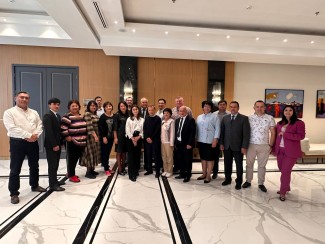Addiction professionals from Central Asia enhanced knowledge on working with population with special clinical needs

The UNODC Regional Office for Central Asia held a Regional Training of Trainers (ToT) on Course 20 – “Populations with Special Clinical Needs” which took place in person in Dushanbe, Tajikistan on 23-27 October 2023. This course is a part of the Advanced Level of the Universal Treatment Curriculum for Substance Use Disorders (UTC training package).
The eighteen (18) members of the national team of trainers from Uzbekistan and Tajikistan attended the training delivered by the team of UTC Regional Master Trainers.
“In today's ever-evolving healthcare landscape, it is imperative that we equip ourselves with the knowledge and skills necessary to address the unique challenges faced by populations with special clinical needs. These individuals may include women, children, the elderly individuals and other group of population with drug use disorders, those facing mental health issues, and many others. These populations often require tailored approaches to care, and it is our collective responsibility to ensure that they receive the highest quality of support and treatment. As trainers, you have a crucial role to play in disseminating knowledge, sharing best practices, and empowering healthcare professionals to provide compassionate and effective care to these vulnerable populations. Your task is not only to educate but also to inspire and motivate others to become advocates for change and champions of inclusivity within their respective fields” said Representative of the UNODC Programme Office in Tajikistan during ceremonial welcome.
This training workshop was devoted to various aspects of working with populations with special clinical needs. Trainers explored the latest research, evidence-based practices, and innovative approaches that can help addiction professionals to better understand the unique needs and challenges faced by these individuals. Participants also were acquittanced with strategies for effective communication, building trust, and promoting patient-centered care within this context.
“In our commitment to providing the best possible care for our patients, understanding the specific needs of diverse populations facing substance use problems is paramount. This course provided us with the opportunity to immerse ourselves in the subject and enrich our professional experience with current knowledges and techniques. Training urges specialists to consider the provision of services from a new perspective in terms of the specific needs of different groups of people. This approach increases the level of professional competence of specialists in the field of addiction treatment and surely will have a positive impact on the quality of the services they provide” said Dr. Amir Rashidov, Narcologist of the Republican Specialized Scientific-Practical Medical Centre of Mental Health the Ministry of Health of the Republic of Uzbekistan.
“This training is an effective tool for raising awareness to develop skills to recognize, understand and meet the individual needs of special populations affected by substance use disorder. The training helped me to increase my knowledge on different approaches to provide medical care to members of the population with special clinical needs. I learned how important it is to consider not only the cultural, but also the physical and psychological constitution of members of a population during the treatment” said Dr. Vladimir Magkoev, Narcologist of the Republican Clinical Narcology Centre of the Ministry of Health of the Republic of Tajikistan.
The training was organized within the framework of UNODC global project GLOK32 “UNODC-WHO programme on drug dependence and care” in collaboration with Sub-programme 3: Addressing drug problems, increasing treatment of drug use disorders and preventing HIV/AIDS” of the UNODC Programme for Central Asia for 2022-2025 and Prevention, Treatment and Rehabilitation Section, UNODC HQ with financial support from U.S. Department of State’s Bureau of International Narcotics and Law Enforcement Affairs.